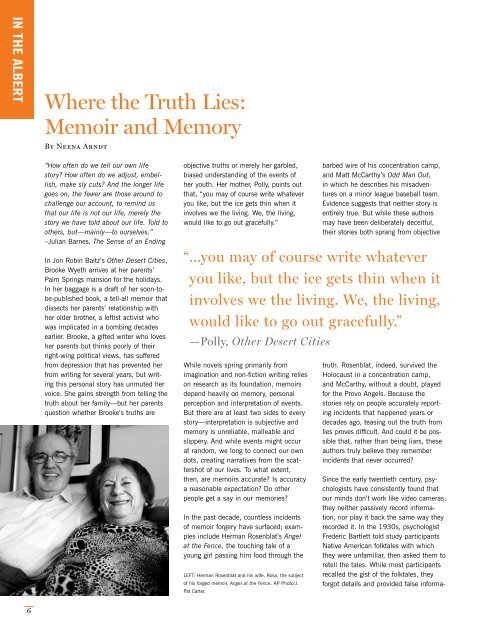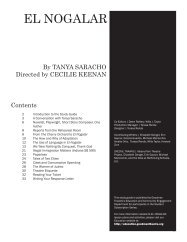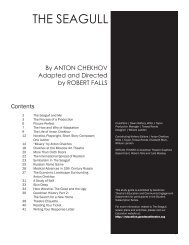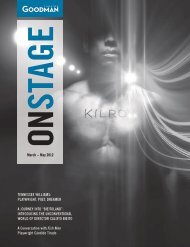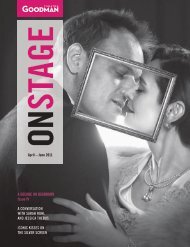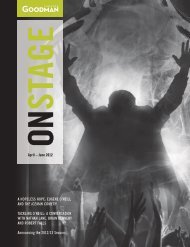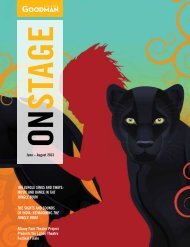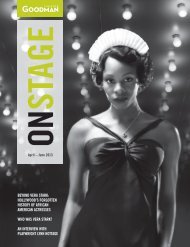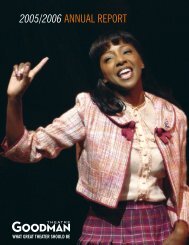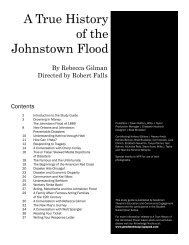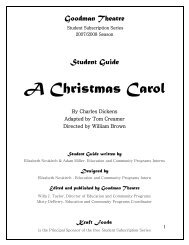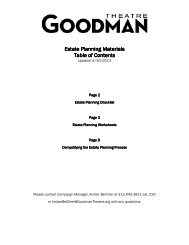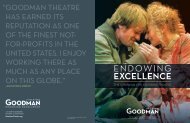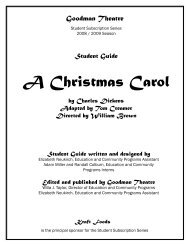Create successful ePaper yourself
Turn your PDF publications into a flip-book with our unique Google optimized e-Paper software.
IN THE ALBERT<br />
Where the Truth Lies:<br />
Memoir and Memory<br />
By Neena Arndt<br />
“How often do we tell our own life<br />
story? How often do we adjust, embellish,<br />
make sly cuts? And the longer life<br />
goes on, the fewer are those around to<br />
challenge our account, to remind us<br />
that our life is not our life, merely the<br />
story we have told about our life. Told to<br />
others, but—mainly—to ourselves.”<br />
–Julian Barnes, The Sense of an Ending<br />
In Jon Robin Baitz’s Other Desert Cities,<br />
Brooke Wyeth arrives at her parents’<br />
Palm Springs mansion for the holidays.<br />
In her baggage is a draft of her soon-tobe-published<br />
book, a tell-all memoir that<br />
dissects her parents’ relationship with<br />
her older brother, a leftist activist who<br />
was implicated in a bombing decades<br />
earlier. Brooke, a gifted writer who loves<br />
her parents but thinks poorly of their<br />
right-wing political views, has suffered<br />
from depression that has prevented her<br />
from writing for several years, but writing<br />
this personal story has unmuted her<br />
voice. She gains strength from telling the<br />
truth about her family—but her parents<br />
question whether Brooke’s truths are<br />
objective truths or merely her garbled,<br />
biased understanding of the events of<br />
her youth. Her mother, Polly, points out<br />
that, “you may of course write whatever<br />
you like, but the ice gets thin when it<br />
involves we the living. We, the living,<br />
would like to go out gracefully.”<br />
While novels spring primarily from<br />
imagination and non-fiction writing relies<br />
on research as its foundation, memoirs<br />
depend heavily on memory, personal<br />
perception and interpretation of events.<br />
But there are at least two sides to every<br />
story—interpretation is subjective and<br />
memory is unreliable, malleable and<br />
slippery. And while events might occur<br />
at random, we long to connect our own<br />
dots, creating narratives from the scattershot<br />
of our lives. To what extent,<br />
then, are memoirs accurate? Is accuracy<br />
a reasonable expectation? Do other<br />
people get a say in our memories?<br />
In the past decade, countless incidents<br />
of memoir forgery have surfaced; examples<br />
include Herman Rosenblat’s Angel<br />
at the Fence, the touching tale of a<br />
young girl passing him food through the<br />
barbed wire of his concentration camp,<br />
and Matt McCarthy’s Odd Man Out,<br />
in which he describes his misadventures<br />
on a minor league baseball team.<br />
Evidence suggests that neither story is<br />
entirely true. But while these authors<br />
may have been deliberately deceitful,<br />
their stories both sprang from objective<br />
“...you may of course write whatever<br />
you like, but the ice gets thin when it<br />
involves we the living. We, the living,<br />
would like to go out gracefully.”<br />
—Polly, Other Desert Cities<br />
LEFT: Herman Rosenblat and his wife, Rosa, the subject<br />
of his forged memoir, Angel at the Fence. AP Photo/J.<br />
Pat Carter.<br />
truth. Rosenblat, indeed, survived the<br />
Holocaust in a concentration camp,<br />
and McCarthy, without a doubt, played<br />
for the Provo Angels. Because the<br />
stories rely on people accurately reporting<br />
incidents that happened years or<br />
decades ago, teasing out the truth from<br />
lies proves difficult. And could it be possible<br />
that, rather than being liars, these<br />
authors truly believe they remember<br />
incidents that never occurred?<br />
Since the early twentieth century, psychologists<br />
have consistently found that<br />
our minds don’t work like video cameras;<br />
they neither passively record information,<br />
nor play it back the same way they<br />
recorded it. In the 1930s, psychologist<br />
Frederic Bartlett told study participants<br />
Native American folktales with which<br />
they were unfamiliar, then asked them to<br />
retell the tales. While most participants<br />
recalled the gist of the folktales, they<br />
forgot details and provided false informa-<br />
6


